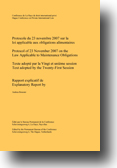CJEU to Rule on Prorogation and Transfer of Jurisdiction under the Brussels II a Regulation
Ester di Napoli earned a PhD from the University of Padova with a dissertation on European private international law in family matters.
The Civil Division of the Court of Appeal of England and Wales recently made a request for a preliminary ruling on the interpretation of Articles 12 and 15 of Regulation (EC) No 2201/2003 concerning jurisdiction and the recognition and enforcement of judgments in matrimonial matters and the matters of parental responsibility (the Brussels II a Regulation). So far, none of these provisions has been the object of a preliminary ruling by the CJEU.
Articles 12 and 15 provide a number of exceptions to the general rule set forth in Article 8, according to which matters of parental responsibility should be decided by the courts of the Member State where the child is habitually resident. Pursuant to Article 12(3), the courts of a Member State shall also have jurisdiction where (a) the child has a substantial connection with that Member State, in particular by virtue of the fact that one of the holders of parental responsibility is habitually resident in that Member State or that the child is a national of that Member State, and (b) the jurisdiction of such court has been accepted by all the parties to the proceedings and is in the best interests of the child (“prorogation of jurisdiction”). Under Article 15, jurisdiction may be transferred, in exceptional circumstances, to a court with which the child “has a particular connection”, provided that the court in question appears to be “better placed to hear the case”.
The CJEU is asked to clarify, in the first place, how long a prorogation of jurisdiction made in conformity with Article 12 should be deemed to last, i.e. whether the jurisdiction of the prorogated court (in the case at hand, a Spanish court) only continues until there has been a final judgment in the proceedings for the benefit of which the prorogation was made, or if it continues “even after the making of a final judgment”. Secondly, as regards Article 15, the CJEU is asked to determine whether jurisdiction may be transferred from one Member State (Spain) to another (United Kingdom) in circumstances where there are no current proceedings concerning the child in the first State.



